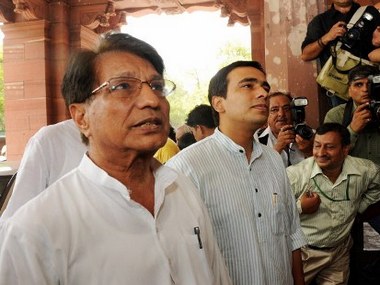The inter-ministerial group looking into how many total seats should airlines of India and Abu Dhabi be allowed to offer each week agreed on 40,000 but four senior ministers of the UPA changed this to “additional 40,000”. This seemingly minor change in language lead to the game changing decision of the Ministry of Civil Aviation to award in total over 50,000 seats a week to Abu Dhabi (including the existing 13,300 per week) this April.
“The IMG said 40,000 seats should be the total offered by airline of either country each week. But the Group of Ministers allowed up to 40,000 additional seats. We finally agreed to only 36,000 additional seats,” sources in the Ministry of Civil Aviation told Firstpost, adding this fact will be highlighted in the revised Cabinet note for getting the final clearance to the India-Abu Dhabi Air Services Agreement amendment. The note is now with Civil Aviation Minister Ajit Singh before it is submitted to the Cabinet. There is no clarity as of now on when the Union Cabinet will meet to take up this controversial ASA amendment.
[caption id=“attachment_1033033” align=“alignright” width=“380”]
 Clearly, Ajit Singh was so sure about his position in the matter that he brushed aside all these concerns. AFP[/caption]
Clearly, Ajit Singh was so sure about his position in the matter that he brushed aside all these concerns. AFP[/caption]
The sequence of events which lead to this ASA began in April when a joint secretary in the Ministry of Civil Aviation lead the Indian delegation to Abu Dhabi to conduct negotiations over enhancing weekly seat entitlements for airlines of both countries. As we said earlier, his mandate was actually to merely agree to about 27,000 additional seats a week so that the total (after taking 13,300 existing seats into account) comes to about 40,000 seats a week. This was the recommendation made by the IMG, which comprises top babus of various ministries. But when the delegation came back, about 40,000 additional seats per week had been given away.
What altered the figure so drastically? Not only did the four Indian ministers agree to what many call a “sell out”, it is believed that Abu Dhabi officials made it clear during negotiations that unless their flag carrier Etihad Airways gets this hugely inflated number of seats and more ports of call to operate in India, they will not allow the equity deal between Jet Airways and Etihad to proceed. Etihad announced its decision to pick up 24% equity stake in Jet on the day the ASA negotiations were concluded. The Abu Dhabi officials obviously made no bones about linking the equity deal to the bilateral amendment.
Impact Shorts
More ShortsSources quoted earlier not only sought to put the onus of the revised ASA on the four ministers lead by Finance Minister P Chidambaram, they also brushed aside various objections raised by airlines and airports to the revised ASA.
“India does not have only private airports, at Delhi and Mumbai, but has hundreds of smaller airports which have no objection to this bilateral agreement. As for airlines, their only objection was to any substantial increase in seats. We still have about 3,000 seats per week under the existing ASA with us which any Indian carrier can ask for. So where is the problem?” these sources wondered.
When asked whether the proper chronology of events has been now incorporated in the Cabinet note, they replied in the affirmative. A second, revised Cabinet note became necessary after the Prime Minister’s Office (PMO) issued an unprecedented and detailed clarification over the India-Abu Dhabi ASA revision in June, about two months after the negotiations had been concluded. While seeking to wash its hands of the matter, the PMO also made some interesting admissions:
The civil aviation minister did go against an inter-ministerial group’s recommendations and this is why the matter went to the PM in the first place.
The case for allowing almost 50,000 weekly seats to Abu Dhabi was made by the four ministers - Finance Minister P Chidambaram, Commerce Minister Anand Sharma, External Affairs Minister Salman Khursheed and Civil Aviation Minister Ajit Singh. But the PM himself agreed to go against the IMG and gave an “in principle” approval for negotiations for this large increase in bilateral rights.
- It was the PM, his office says, who asked for Cabinet approval for this amendment in bilateral and has then asked Civil Aviation Ministry to amend an earlier cabinet note. And incorporate complexities surrounding the bilateral and all pertinent discussions around it before it was signed.
The note from PMO which went out on June 13th to the Ministry of Civil Aviation very subtly tries to put the onus of the bilateral revision on Ajit Singh. It says the Cabinet note prepared by Singh’s ministry earlier does not mention that Singh approached the PMO and the PM himself after the IMG meeting, seeking urgent clearance to conclude the talks with Abu Dhabi. It also does not mention that the four ministers, when they did agree on the new seat entitlement figure, wanted another urgent meeting with the PM to brief him on the matter.
In this meeting, Singh was told about objections of the Department of Economic Affairs over granting such a huge increase in weekly seat entitlements to Abu Dhabi; media reports of airlines and airports being unhappy with such a step; even that it is possible that Etihad takes control of bulk of seats on this route through Jet. Singh was also warned about other airlines coming forward with similar requests and the importance of therefore adopting a calibrated approach in the matter.
Clearly, Ajit Singh was so sure about his position in the matter that he brushed aside all these concerns. And his officials now say the entire chronology of events has been detailed in the revised Cabinet note; he seems secure in the knowledge that he was not alone in taking this game-changer decision and had more powerful Cabinet colleagues by his side.
Now, the PM and indeed his Cabinet colleagues are caught between a rock and a hard place: Can India, which has been a more than willing signatory to the ASA, now back out because it has problems in its own backyard? Is it feasible diplomatically? Can it now take the option of keeping the increase in seats in abeyance till the “storm” brewing over it dies down?
Technically speaking, the Cabinet has the power to reverse the ASA amendment. But in diplomatic terms, this will be suicide. Besides, if we do chuck all diplomatic conventions and annul the ASA or put it in abeyance, why would Etihad continue to be interested in Jet Airways. Simply put, if the ASA goes, so does the equity deal. Can we really afford to return the largest FDI investment in India this year?
)